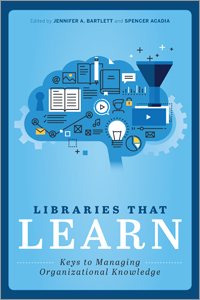Primary tabs
You don't need to be an ALA Member to purchase from the ALA Store, but you'll be asked to create an online account/profile during the checkout to proceed. This Web Account is for both Members and non-Members.
If you are Tax-Exempt, please verify that your account is currently set up as exempt before placing your order, as our new fulfillment center will need current documentation. Learn how to verify here.
- Description
- Table of Contents
- About the authors
- Reviews
Sharing organizational knowledge supports onboarding, coaching, mentoring, and the day-to-day smooth functioning of the workplace. So why are the procedures, policies, and best practices for your organization often so hard to find? Although the term “knowledge management” might conjure up images of a bureaucratic labyrinth, essentially it means getting the right information to the right people at the right time. A lot of that information is embedded in work practices or may be siloed where it can’t easily be shared; managing it successfully hinges on effective communication with every person on your team. This book surveys approaches to knowledge management (KM) that address hierarchical power structures and internal competition to get measurable results. With insights drawn from six case studies at academic and special libraries, in this book you’ll find guidance on such topics as
- demystifying KM by reframing the concept to reflect organizational needs;
- the six elements of an actionable knowledge audit;
- how to harvest insights from staff at all levels of the organization;
- ten characteristics that define effective communities of practice;
- enabling KM through platforms like WordPress, Google Drive, and Dropbox or by adapting library tools like LibAnswers or ArchiveSpace;
- fostering knowledge sharing among liaison librarians;
- how interim administrators can develop a KM plan;
- sharing tacit knowledge with storytelling; and
- methods for securing knowledge before employee departure.
Your library already contains organizational knowledge—both in your employees and in your institution; this book will lead you towards guiding, fostering, and organizing that knowledge for improved organizational fitness.
List of Figures
Preface
Part I Overview and Context
Chapter 1 Histories, Theories, and Perspectives of Knowledge Management
Spencer Acadia
Chapter 2 Challenges and Issues in Managing Organizational Knowledge
Spencer Acadia and Jennifer A. Bartlett
Chapter 3 Conceptual and Technological Tools for Knowledge Management
Jennifer A. Bartlett and Spencer Acadia
Chapter 4 Predicting the Future of Knowledge Management
H. Frank Cervone
Part II Case Studies
Chapter 5 Chaos Controlled: A Special Library’s Approach to Knowledge Management
Linna R. Agne and Debra P. Brookhart
Chapter 6 Fostering Knowledge Sharing among Liaison Librarians
Diana Dill and Alice Kalinowski
Chapter 7 Managing Knowledge, Managing Change: An Interim Leadership Experience
Rachael Dreyer and Jennie Levine Knies
Chapter 8 Using LibAnswers to Create an Internal Staff Handbook
Jeremiah Paschke-Wood and Anne E. Wilson
Chapter 9 From Wiki to Blog: An Academic Library’s Journey to a Collaborative Knowledge Management System
Junior Tidal
Chapter 10 Securing Knowledge before Employee Departure: Do Wikis Work?
Nancy J. Weiner
Afterword, by Jennifer A. Bartlett
About the Editors and Contributors
Index
Jennifer A. Bartlett
Jennifer A. Bartlett is an assistant professor and the interim associate dean for teaching, learning, and research at the University of Kentucky Libraries. She has worked in academic and public libraries for 20+ years and focuses on public services, access services, and academic library management and administration. Since 2011, she has authored the "New and Noteworthy" column in Library Leadership and Management, the journal of ALA’s Library Leadership and Management Association (LLAMA). She is active in the Kentucky Library Association, the Special Libraries Association, and is also a member of the International Federation of Library Associations (IFLA) Knowledge Management Standing Committee.
Spencer Acadia
Spencer Acadia has 10+ years of academic library experience in collection development and acquisitions, digital and data scholarship, and research methods, as well as several years of experience as professor of record in teaching courses in psychology and sociology. He is a standing committee member in the IFLA Knowledge Management Section and participates in the IFLA Digital Scholarship / Digital Humanities Special Interest Group. His research interests include the social, cultural, and behavioral aspects of organizational knowledge and knowledge management, as well as the roles of information professionals in cultural heritage activity. In addition to an M.L.S., he holds an M.A. in psychology and a Ph.D. in sociology.
"A thoroughly well-documented approach to modern librarianship. The editors include case studies authored by experts in the field that discuss a wide range of topics important to today's academic libraries, including resource management, examples of effective leadership, and how to use information technology ... Every academic library should have a copy of this well-written and easy-to-navigate publication."
— Booklist
"A wide variety of current knowledge management tools are examined, including DSpace, Slack, Box, LibGuides, wikis, Google Drive, and Dropbox. This is a useful book for anyone looking to improve knowledge flow through a library organization."
— CHOICE
"Bartlett and Acadia provide a notable introduction to KM and the role it can play in libraries. Any librarian not familiar with KM or looking for a brief introduction to it, should read Bartlett and Acadia’s work."
— Catholic Library World
"Administrators seeking ways to achieve more efficient staff time and streamlined access to internal data will appreciate this title."
— Library Journal



